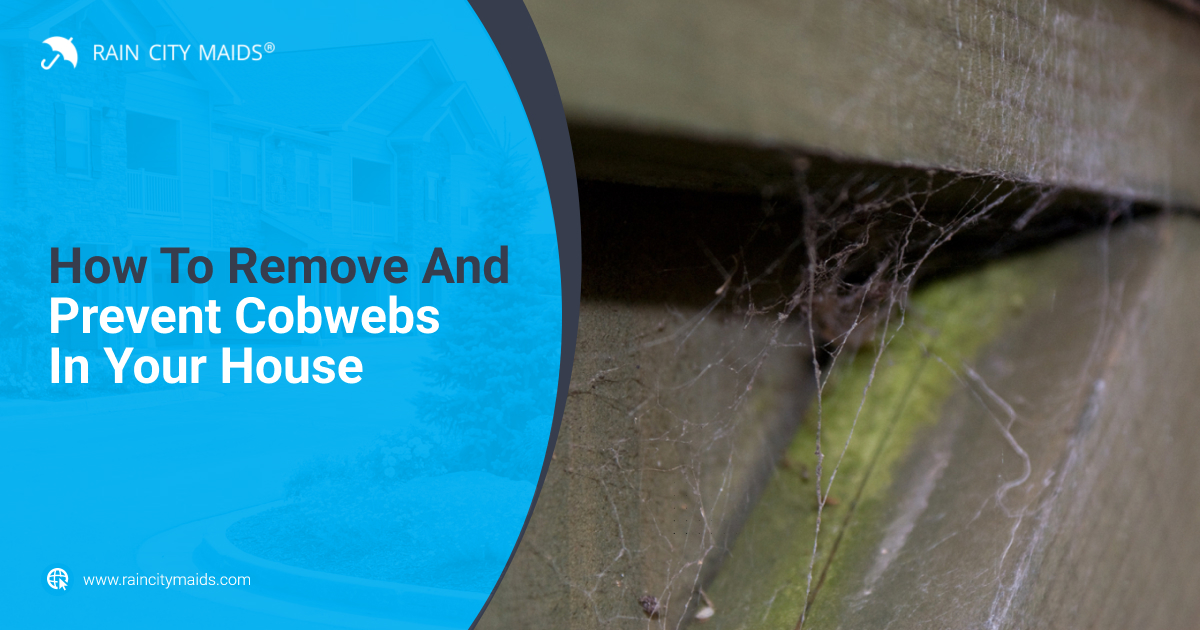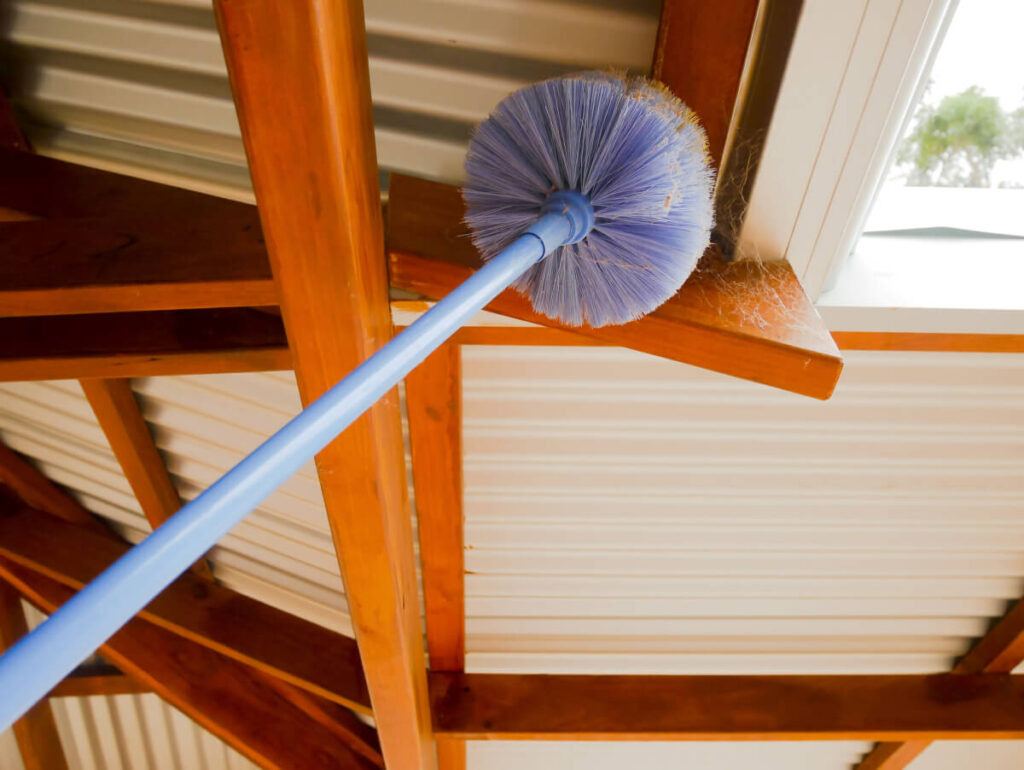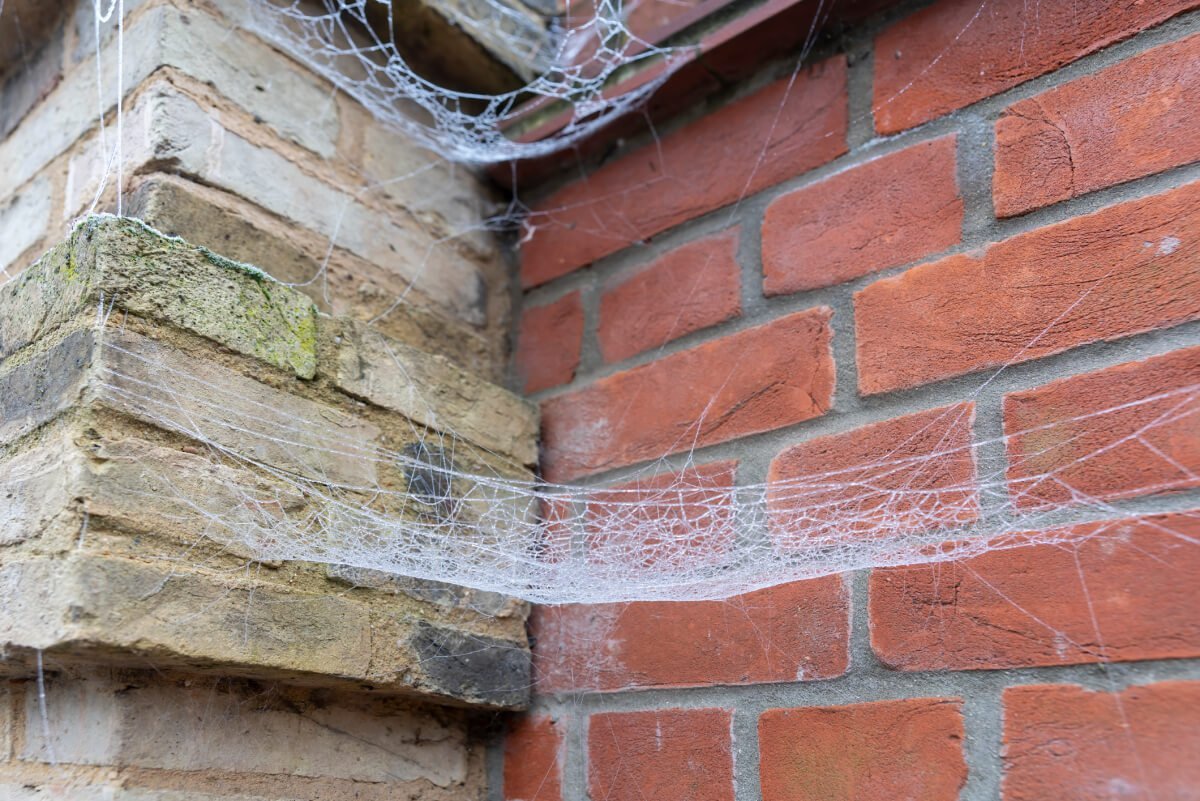To avoid spider webs in your house, regularly clean and vacuum. Seal cracks and gaps to block spider entry.
Spiders often enter homes seeking food and shelter, creating webs in undisturbed areas. Regular cleaning and vacuuming can significantly reduce the likelihood of spider webs forming. Seal any cracks, gaps, or holes in walls, windows, and doors to prevent spiders from entering.
Keep your home clutter-free, as spiders often hide in piles of clothing, boxes, and other items. Use natural repellents like peppermint oil or vinegar to deter spiders. Proper lighting and the removal of outdoor debris can also help keep spiders away. Consistent maintenance and vigilance are key to keeping your home spider-free and clean.

Credit: www.raincitymaids.com
Common Spider Species
Spiders can be a nuisance in homes. Understanding the common species helps in managing them effectively. Each spider has unique traits. Knowing these traits aids in identification and removal.
Identifying House Spiders
House spiders vary in size and color. Here are some common ones:
| Spider Species | Appearance | Habitat |
|---|---|---|
| Common House Spider | Small, brown or gray | Dark corners |
| Wolf Spider | Large, hairy, brown | Basements, garages |
| Cellar Spider | Long legs, pale color | Basements, cellars |
| Black Widow | Black with red hourglass | Cluttered areas, sheds |
Risk Assessment
Some spiders are harmless. Others pose risks. Assessing the risk is crucial.
- Common House Spider: Generally harmless.
- Wolf Spider: Can bite if provoked.
- Cellar Spider: Harmless to humans.
- Black Widow: Venomous, dangerous to humans.
Understanding these risks helps in taking appropriate action. Regular cleaning and decluttering reduce spider infestations. Seal cracks and gaps to prevent spider entry. Use natural repellents like peppermint oil. Keep your home tidy to avoid attracting spiders.
Understanding Spider Behavior
Spiders are fascinating creatures with unique habits and preferences. To keep your home spider-free, you need to understand spider behavior. This knowledge will help you take the right steps to avoid spider webs in your house.
Why Spiders Build Webs
Spiders build webs for different reasons. The most common reason is to catch prey. Their webs act like traps for unsuspecting insects. When an insect gets caught, the spider quickly wraps it up.
Another reason spiders build webs is for shelter. Webs provide a safe place for spiders to hide from predators. They also use webs to protect their eggs.
Preferred Locations
Spiders have specific preferred locations for building their webs. They often choose places where they won’t be disturbed.
- Corners of rooms
- Ceiling edges
- Dark, undisturbed areas
- Basements and attics
Spiders also prefer areas with a steady food supply. If you have many insects, you will likely see more spiders.
Keeping your home clean and free of insects can reduce the likelihood of spiders building webs.
Prevention Techniques
Keeping your house free of spider webs can be challenging. But with the right prevention techniques, you can make it spider-free. Here, we’ll explore some effective methods to avoid spider webs in your home.
Sealing Entry Points
Spiders enter homes through small gaps and cracks. To stop them, start by sealing entry points.
- Check windows and doors for any gaps.
- Use caulk to seal cracks in walls.
- Install weather stripping to close gaps under doors.
These steps will reduce the chances of spiders getting inside.
Regular Cleaning
Regular cleaning is crucial to keep spiders away. Cleaning removes spiders and their webs.
- Dust and vacuum your home weekly.
- Pay extra attention to corners and ceilings.
- Use a broom to remove webs you see.
Keeping your home clean makes it less inviting for spiders.
Consider using a cleaning schedule. A schedule ensures no spot is missed. Here’s a simple table to help you:
| Day | Cleaning Task |
|---|---|
| Monday | Dust furniture |
| Wednesday | Vacuum floors |
| Friday | Clean corners and ceilings |
These steps will help keep your house spider-free.
Natural Repellents
Are you tired of dealing with spider webs in your house? Using natural repellents can be a safe and effective way to keep spiders at bay. These solutions are not only easy to make but also eco-friendly. Let’s explore some of the best natural repellents to keep your home spider-free.
Essential Oils
Essential oils are powerful and fragrant. They can effectively repel spiders. Here are some of the best ones to use:
- Peppermint Oil: Mix 10 drops of peppermint oil with water. Spray this mixture around your home.
- Lavender Oil: Spiders dislike lavender. Mix 10 drops with water and spray it.
- Tea Tree Oil: Combine 10 drops of tea tree oil with water. Use it as a spray.
These oils not only keep spiders away but also make your home smell wonderful.
Herbal Solutions
Herbs are another great natural way to repel spiders. Here are some effective herbal solutions:
- Mint: Place fresh mint leaves around your home. Spiders hate the smell.
- Eucalyptus: Use eucalyptus leaves or oil in areas prone to spiders.
- Citrus: Rub citrus peels on windowsills and door frames. Spiders dislike citrus scents.
These herbs are easy to find and safe to use. They create a spider-free environment in your home.
| Essential Oils | Herbal Solutions |
|---|---|
| Peppermint Oil | Mint |
| Lavender Oil | Eucalyptus |
| Tea Tree Oil | Citrus |
Using these natural repellents ensures your home stays free from spiders. Plus, they are safe for your family and pets.
Chemical Solutions
Chemical solutions can effectively help in preventing spider webs in your house. They work by eliminating spiders and other insects they prey on, reducing the likelihood of webs forming.
Insecticides
Using insecticides is one of the most common chemical solutions. They help in killing spiders and other pests.
- Spray insecticides in corners, windows, and doorways.
- Choose broad-spectrum insecticides to target multiple pests.
- Use residual sprays to keep spiders away for a longer period.
Always follow the instructions on the insecticide label. This ensures effective and safe use.
Safety Measures
While using chemical solutions, it’s important to follow safety measures. This protects you, your family, and pets.
- Wear gloves and a mask when applying insecticides.
- Ventilate the area well after spraying.
- Keep children and pets away from treated areas until dry.
Store chemicals in a safe place, away from children and pets. Use natural alternatives like essential oils if you prefer a non-toxic solution.
Using Physical Barriers
Using physical barriers is a practical way to avoid spider webs in your house. These barriers prevent spiders from entering your home. This section explores two effective methods: screens and nets, and weather stripping.
Screens And Nets
Install screens and nets on your windows and doors. These barriers keep spiders and other insects out. Ensure the screens have no holes. Even small tears can let spiders in. Clean the screens regularly. Dust and debris can weaken the screens. Use a vacuum or a damp cloth for cleaning.
Weather Stripping
Apply weather stripping around doors and windows. This seals gaps where spiders might enter. Choose high-quality weather stripping. It lasts longer and is more effective. Measure the gaps before buying. This ensures you get the right size. Install the weather stripping carefully. Follow the manufacturer’s instructions for best results.
| Physical Barrier | Benefits |
|---|---|
| Screens and Nets | Keeps spiders out, easy to install, durable |
| Weather Stripping | Seals gaps, energy efficient, cost-effective |
Using these physical barriers, you can keep your house free of spider webs. Both screens and weather stripping are effective and easy to use.
Attracting Natural Predators
Attracting natural predators is an effective way to reduce spider webs in your house. These predators help control the spider population naturally and safely.
Birds And Lizards
Birds and lizards are excellent spider predators. They hunt and eat spiders, keeping their numbers down. To attract birds, set up bird feeders and birdhouses in your garden. Plant native trees and shrubs to provide shelter.
Lizards enjoy sunny spots and plenty of cover. Create rock piles or install garden ornaments where lizards can hide. Both birds and lizards will help in maintaining a spider-free home.
Beneficial Insects
Some insects also eat spiders and their eggs. Ladybugs and wasps are two beneficial insects that hunt spiders. You can encourage these insects by planting flowers that produce nectar.
| Insect | Plants to Attract |
|---|---|
| Ladybugs | Marigolds, Dandelions, and Dill |
| Wasps | Yarrow, Queen Anne’s Lace, and Fennel |
These insects will help control the spider population. Ensure you have a variety of plants to attract them. This natural method is effective and eco-friendly.
:max_bytes(150000):strip_icc()/effective-tips-for-controlling-house-spiders-2656497-ADD-COLOR-477c952b5c9441a7a7f30a4bc67d1b32.png)
Credit: www.thespruce.com
Professional Help
Dealing with spiders at home can be stressful. Sometimes, you need professional help. Experts can effectively manage spider problems. They ensure your home stays web-free.
When To Call An Exterminator
If you see webs often, call an exterminator. A professional can handle infestations. Don’t wait until it’s severe. Call an expert when you notice:
- Multiple spider webs in different rooms
- Spiders appearing frequently
- Large, dangerous spiders
What To Expect
When you hire an exterminator, expect a thorough inspection. They will check your home for webs and spiders. The exterminator will:
- Inspect all rooms and corners
- Identify spider species
- Apply safe and effective treatments
- Offer tips to prevent future issues
Professionals use safe products. They ensure your family and pets are safe. They also provide long-term solutions. This means fewer spiders and webs in the future.

Credit: www.yalepest.com
Frequently Asked Questions
How Can I Prevent Spider Webs In My House?
Keep your home clean and clutter-free. Regularly dust and vacuum to remove spiders and their webs. Seal cracks and gaps in windows and doors to prevent spiders from entering.
What Attracts Spiders To My Home?
Spiders are attracted to homes with ample food sources like insects. Dark, undisturbed areas provide ideal hiding spots. Regular cleaning can help deter them.
How Often Should I Clean To Avoid Spider Webs?
Clean your home at least once a week. Regular cleaning disrupts spider habitats and removes existing webs. Focus on corners and less-visited areas.
Do Essential Oils Repel Spiders?
Yes, essential oils like peppermint and tea tree can repel spiders. Mix with water and spray in corners. They dislike the strong scent.
Conclusion
Keeping your home spider-free is simple with regular cleaning and sealing entry points. Use natural repellents for added protection. By following these steps, you can maintain a clean, spider-free environment. Enjoy a comfortable home without the worry of unwanted webs.
Take action now to ensure a spider-free living space.
Related posts:

I’m MD Tanvir, and I bring years of expertise gained from working closely with pest control companies to the forefront. My journey in the industry has inspired me to launch Bug Battler, a platform aimed at equipping people with the know-how to combat pests autonomously. Through Bug Battler, I aim to empower individuals with practical insights to tackle pest infestations effectively.

